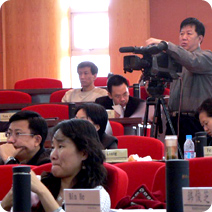|
|
|||||||
|
The data people generate can be used to create value. My courses teach how to create that value. I build on my real-world experiences with small startups and large multinationals, bring in guest speakers from my network of innovators, and assign exercises using actual data sets. My knowledge of the state of the art in data mining and e-business strategy is built on a foundation of 15 years of teaching and research, resulting in more than 100 published papers. My research on machine learning and predictive modeling was done as a post-doc at Xerox PARC and the Santa Fe Institute, and as full-time faculty, first as an assistant professor in Computer Science and Cognitive Science at the University of Colorado at Boulder, then as an associate professor at the Stern School of Business at New York University (NYU). In 2003, while serving as Amazon.com's chief scientist, I was approached by the Statistics Department at Stanford to develop a course on data mining and e-business. In 2008, the Haas School of Business at UC Berkeley asked me to create a course addressing how consumer participation has transformed marketing. Both courses are being taught again in Spring 2009. I also teach in top executive MBA programs in Europe and China.
Gathering, sharing, and storing data has become trivial. But what shall we collect, and what applications can we build that users really want? Moving beyond graph and guess, push and pray, and launch and learn, this course gives you tools and strategies for successful applications. How can you optimize their virality, and spot weaknesses early? How can you entice users to interact with the app, and recommend it to their friends? We will have stimulating conversations with guests who will share their first hand experiences. In the last years, speakers have included Jeff Hammerbacher (former head of data at Facebook), Reid Hoffman (founder and CEO of LinkedIn), Jan Pedersen (former chief scientist at Yahoo), Joshua Schachter (founder of del.icio.us), Toby Segaran (author of "Collective Intelligence"), Dave Sifry (founder of Technorati), and Bill Tancer (GM of Hitwise Research). Students are expected to actively engage in class, bringing their diverse backgrounds to bear. Hands-on assignments include leveraging web analytics, applying geolocation to dating, creating a recommender system for Twitter, and building a Facebook app. This course will dramatically change how you think about your personal river of data and what you can do with it. E-business is about much more than selling books. 2009 course description | course wiki | student network | readings etc.
The social data revolution has spawned radically new expectations in customers, and created critically new needs for business. Marketing 2.x introduces the new communication technologies and their resulting data strategies in a business context. Using real-world examples such as Facebook, Twitter and Yelp, including in-class discussions with executives from these companies, this course teaches students how to immediately leverage the rich trove of new marketing information available to those who can make use of it. Developed in 2008, the course distills insights and practices gleaned from the instructor's 15 years of experience with customer-centric organization as an expert in people and the data they create. Students come away with the specific tools needed in today's competitive, highly networked marketplace. They learn to help their own organizations to understand their social media landscape, to create new products and services, and to better serve existing and potential customers. 2009 course description : course wiki | student network | readings etc.
In addition to this course at the Haas School of Business, I was asked to conduct a research seminar, titled The Consumer Data Revolution: The Future of Relationships?, in the fall of 2008 at UC Berkeley's iSchool (INFO290A) That series of five weekly sessions for faculty and graduate students explored the topics of relevance, predictive models, identity and portability, relationships, and community, all in the context of social data. Results are summarized in the class wiki. We also made available audio recordings and transcripts of all sessions. The iSchool, Berkeley's School of Information (formerly the Library School), was reshaped by Hal Varian, Google's chief economist, to address the issues and implications of the information revolution. It continues to seek out and explore new data paradigms and their implications.
This course discusses the impact of the social data revolution on individuals, business, and society. Companies now have the potential to create unprecedented business transparency internally, and derive unprecedented value for their customers. Applications and implications range from personalization, recommendations, and online marketing to collective intelligence and Enterprise 2.0. Specific topics covered in September 2009 and January 2010 include:
The students in the Tsinghua / INSEAD Executive MBA program will participate in class discussion and group exercises, and can write their required reflection paper on a topic related to this class with permission of the instructor. Since my first courses at Peking University and at Fudan in 1994, I have taught thousands of executives at China’s top schools, including Tsinghua University, Shanghai Jiao Tong University, Cheung Kong Graduate School of Business, and CEIBS (China Europe International Business School). Since 2000, I also maintain a residence in Shanghai, in addition to San Francisco.
I am also available for executive education.
|
: Tsinghua :
 



Looking for the 2009 class notes? Prefer to listen to the lectures? Curious about the guest speakers? Watch the essence of their talks, subscribe to the Youtube channel, and join the Social Data Revolution on Facebook |
||||||